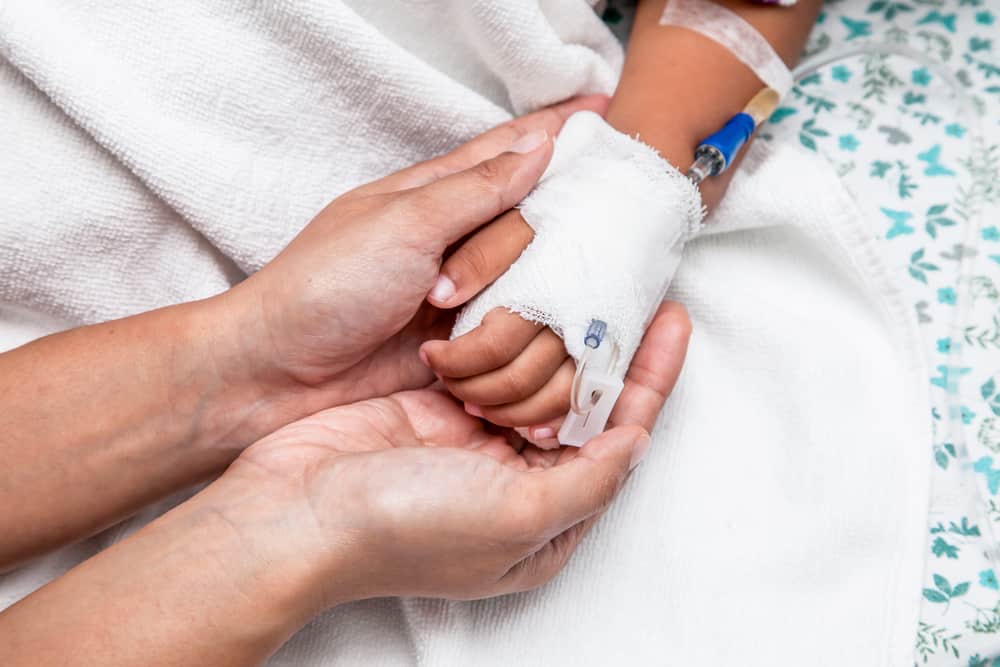Contents:
- Medical Video: Liver Transplant: Living donor, a Mother's Life-Saving Gift | Cincinnati Children's
- Infection
- New heart rejection
- Acute rejection
- Chronic rejection
- Side effects of immunosuppressant drugs
- High risk of infection
- Diabetes
- High blood pressure
- Complications related to surgery
Medical Video: Liver Transplant: Living donor, a Mother's Life-Saving Gift | Cincinnati Children's
In all types of surgery, there is always a risk of complications. The same is true for liver transplants. Possible high complications in the first 3-6 months. The main complications of liver transplantation are infection, rejection of the new liver, side effects of immunosuppressant drugs and other complications associated with surgery. Fortunately, this complication can be prevented by good hygiene, maintaining a healthy lifestyle and using immunosuppressant drugs as instructed by a doctor. The following is a more detailed explanation of each complication:
Infection
Your child is more at risk of infection after a liver transplant. The immune system is weak and more susceptible to attack pathogens that can infect. It has been shown that liver transplant patients are more at risk of viral infection more than other infections. These viral infections include influenza, chicken pox, mumps, cytomegalovirus (CMV) and Epstein-Barr virus (EBV). It is recommended to get an annual flu vaccination to prevent flu. Make sure your child is not left behind following other recommended vaccinations.
Bacterial infections may also occur. Especially in parts where other drugs or liquids given during transplantation can cause this infection. This is called line infection. Other bacterial infections are from wounds. Tell your doctor if your child's wounds do not heal properly or have the following signs or symptoms:
- Swelling
- Pain
- Exit fluid or drainage at the infected location
- Tired and weak
- Fever
- Rash
- Or pain around the wound.
In rare cases, your child can develop a fungal infection. Some common fungal infections include canker sores or mouth fungal infections (candida) and jiroveci pneumonia (PCP). This infection can be serious but can be treated. Tell your doctor if your child shows signs of infection.
New heart rejection
In any type of transplant, there is a risk of rejection. This means that your child's body may not respond well to a new heart. Your child's immune system may feel threatened by a new liver and start activating the immune response to new liver cells. This is why doctors prescribe immunosuppressant drugs. There are two types of rejection.
Acute rejection
Acute rejection can occur several times in the first few months. About 50% of children will have at least one episode with the highest risk during the first 4-6 weeks. Usually the liver will recover from damage, as long as your child continues to use immune system suppressants. Usually the first sign is an increase in liver tests. Other signs and symptoms may include:
- Poor appetite
- Flu-like symptoms
- Yellow skin and eyes
- Pale stool
- Dark urine
- Swelling of the stomach
- Fever
- Pain or pain in the abdomen.
Usually the doctor will diagnose rejection by doing a liver biopsy, which tests the sample of liver cells. Don't wait until the next doctor's meeting to tell the doctor about your child's new symptoms. Approximately 90% of episodes of rejection can be treated effectively with an increase in the dose of the drug.
Chronic rejection
Chronic rejection is rare. About less than 2-3% of liver transplants in children end in chronic rejection. Chronic rejection usually cannot retreat.
Side effects of immunosuppressant drugs
Make sure your child uses immunosuppressant drugs that are very important for their survival. Immunosuppressant drugs work by suppressing your child's immune system to reduce the risk of liver rejection. Your child will take a combination of drugs. In addition to immunosuppressant drugs, your child may also need to use steroids such as prednisone. Immunosuppressant drugs may include tacrolimus (Prograf®) or mycophenolate (Cellcept®). The disadvantage is that there are many side effects.
High risk of infection
When the immune system is suppressed, it is difficult to fight other pathogens found in your child's environment. This is why it is important to reduce the risk of infection. You must make sure your child is washing hands before eating any food and after using the toilet. Also try to avoid crowded areas and people who are coughing or runny nose. Your doctor will give the right dose for your child to balance between prevention of rejection and the risk of infection.
Diabetes
A side effect of immunosuppressant drugs is an increase in blood sugar levels. You should check your child's blood sugar regularly. If needed, the doctor may adjust the medication if the blood sugar is too high. Also try to adjust your child's diet. Foods with high sugar levels will also increase the risk of developing diabetes.
High blood pressure
Your child is also at risk of developing high blood pressure. This is a common side effect of drugs such as prednisone, tacrolimus and sirolimus. Monitor your child's blood pressure regularly. If you don't have a blood pressure machine at home, you can visit the nearest pharmacy or doctor's clinic. Making sure your child does regular exercise will also help your child to maintain healthy blood pressure. Talk to your doctor if you have any concerns.
Complications related to surgery
Right after surgery, your child has the highest risk of complications associated with surgery. These complications might include:
- Blood vessel blockage: This is usually diagnosed by doing Doppler ultrasound on the liver and angiogram. Any type of blockage of blood vessels will cause loss of blood flow and low levels of oxygen, causing scarring and infection. If this happens, your child may need surgery to open a blocked artery. Two types of blockages are in the heart arteries (hepatic artery thrombosis) and portal veins (vein thrombosis portal).
- Bleeding: Bleeding can occur during transplantation and even after surgery. Most freezing is made in the liver. If the liver is not functioning, your child may not be able to stop bleeding. This can occur in the first 12 hours of transplantation.
- Primary non-function: This indicates that the heart does not work properly from the start. This occurs in about 1% of transplant patients. If the liver does not respond or function fast enough, your doctor must find another donor for a healthy liver.
- Biliary blockage: This occurs when the bile ducts are narrowed or blocked. This may be caused by an infection of the bile duct. Usually associated with swelling in the stomach, fever or pain around the liver. To help doctors treat your child as early as possible, you should report these signs when they occur.
Liver transplants are needed for your child to live a healthier life. To ensure your child does not experience any complications, you can monitor the warning signs and make sure he uses the drug as instructed by the doctor.












